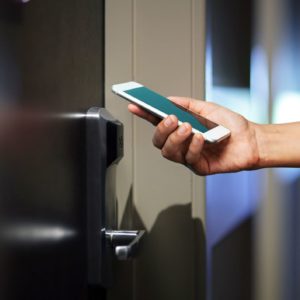2020 will be the year of contactless hospitality
By James Slatter
EMEA managing director at Agilysys
Guests want choice. They want to be self-sufficient whenever it suits them, and they want personal attention when they prefer. The future of hospitality still provides guests with the luxury of choice – as it always has. This becomes especially important as markets regain their footing amidst the COVID-19 outbreak. While the damage to the industry is real, there is also a glimmer of hope. Accommodating a future of contactless hospitality is possible, and the recovery has already begun.
Guests Crave Online Everything – Now is the time to give it to them

Guests will look for flexibility and physical distancing to become standard attributes in their travel and leisure experiences. Technology provides a base upon which operators depend to deliver those experiences, honouring the guest’s individual expectations for as little or as much contact as the guest desires. Whether that means checking-in, accessing their rooms, receiving their folios, communicating with hotel staff, ordering in-room dining, booking resort activities and dining, or paying for their stay all digitally, this year is a defining moment for the future of contactless guest engagement.
Skip Traditional Check-ins

The advent of mobile check-in and digital room key technologies have positioned the traditional practice of front desk queues and check-in delays as a thing of the past. A contactless check-in process no longer inhibits staff workflows or guest experiences. With the driving trend in hospitality innovation being the support of physical distancing, mobile guest check-in, room access and check-out capabilities bring significant value for hotels and resorts who seek to deliver “touchless” alternatives on the other side of the pandemic. The mobile check-in experience further creates “virtual touchpoints” which can translate to upsells and cross-sells for a bit of a revenue boost. Operators use it to extend promotions to guests via their mobile devices. Offers including room upgrades, dining reservations, spa treatments, and other opportunities to entice guests to spend a little bit more than they would if prompted by a front desk agent.
Digital Payments Skyrocket

During the balance of 2020, we will see an increased focus on the convenience and security of cashless payments. The World Health Organization encourages contactless payments to help combat COVID-19, and their use among customers is skyrocketing. Many hoteliers are hastening their switch to various contactless payment methods, including mobile digital wallets and ‘tap and go’ alternatives. Those who made the switch have started by testing a cash-free and credit-card-free model at one of their select locations as a trial run. Much more convenient for both hotel staff and guests, digital payments are increasing as the number of consumers find these payment methods are just as accessible, and safer, than exchanging paper notes or credit cards.
Enhanced Cleanliness Measures

As the travel and leisure world slowly begins to reopen, occupancy rates will remain relatively low while operators continue to satisfy their guest expectations related to social distancing. Hotels and resorts will sell every other room, for example, ensuring there are no guests in neighbouring hotel rooms with the intent of preventing the spread of the virus during guest stays. Additional measures for room cleanliness routines will be the new normal, such as allowing more time in between each stay for deeper cleanings and the dissipation of bacteria. Such “room distancing” also limits the potential for guests to come into contact with one another, further restricting the spread of any contagion.
Improved Staff Collaboration

Hotel staff workflows are inherently mobile, and they are best managed when supported by technology that is also mobile. Internal staff collaboration will be given much higher priority, especially as more stringency is established around enhanced housekeeping measures. Technology is the underpinning of this elevated collaboration. As we look toward the future of hospitality, collaboration tools will be much more inclusive and effective than pre-COVID-19 communication methods, most of which consisted of two-way radios at best. Using technology, operators will have the means to assign, monitor, and manage in-house tasks, resulting in the manual “clipboard processes” finally becoming a thing of the past. Staff communication technology will synchronise with mobile devices – including wearables, phones and tablets – assigned to housekeeping, engineering, valet and other departmental staff. This will allow team members to simply tick off their electronic list as they go about their day. Staff will also receive immediate alerts when a room needs servicing. By reducing the calls to and from the front desk in favour of communicating via the technology, everyone becomes more productive. Beyond the increased productivity, operators will use collaboration software to monitor staff performances as well as forecast labour needs.
Elevated Activities & Amenities

More attention is being given to the particulars of guest activities, such as golf, spa and dining. Take golf, for example. Technology developments will enhance player experiences but with an emphasis on supporting social distancing. For instance, golf carts are being equipped with software that allows players to buy retail and F&B items during their time on the course. The technology will then use geolocation-based functionality to deliver items directly to the player’s cart, thus creating a uniquely personalised time on the links, increasing item sales, and from a safe distance.
Digital Room Keys

The growing demand for mobile service creates opportunities for operators who want increased guest interaction without disrupting the guest’s desire for physical distancing. Digital room keys with secure ID verification will help operators strike the right balance. Once considered science-fiction, technology is available today that will allow guests to bypass the front desk altogether and head straight to their room. Many travellers prefer the comfort of their mobile phones, and that trend will not change post-COVID-19. On the contrary, guests will expect even more opportunities for digital interaction. Mobile room keys provide a smart way to grant guests’ secure access to their rooms and to keep guests engaged in a contactless manner that supports their desired level of personal space.

James Slatter is the EMEA managing director at Agilysys. Agilysys has been a leader in hospitality software for more than 40 years, delivering innovative guest-centric technology solutions for gaming, hotels, resorts and cruise, corporate foodservice management, restaurants, universities, stadia and healthcare.







